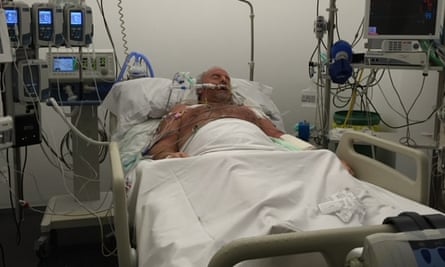
‘They thought I had cancer’: painkiller banned in UK linked to Britons’ deaths in Spain | Drugs
A patients group representing several British victims has launched legal action against the Spanish government over claims it failed to safeguard people against the potentially fatal side effects of one of the country’s most popular painkillers, involved in a series of serious illnesses and deaths.
The drug metamizole, commonly sold in Spain under the brand name Nolotil, is banned in several countries, including Britain, the US, India and Australia. It can cause a condition known as agranulocytosis, which reduces white blood cells, increasing the risk of potentially fatal infection.
The Association of Drug Affected Patients (ADAF) says adverse reactions to the drugs have led to sepsis, organ failure and amputations. It has identified about 350 suspected cases of agranulocytosis between 1996 and 2023, including those of 170 Britons who live in Spain or were on holiday there.
The ADAF is examining more than 40 fatalities in which it considers the drug may have led, or contributed, to death. The patients group says that case reports, including a 2009 study, suggest the British population may be more susceptible to the drug’s side effects, but this has not been confirmed by independent scientific study.
The group is demanding an investigation into the drug and new controls. It filed its action on 14 November in the national court in Madrid. Cristina García del Campo, founder of the organisation, said: “This drug has destroyed people’s lives and it should now be withdrawn. One lady took three tablets and she had part of her feet amputated and several fingers. Even if it doesn’t kill you, once you’ve had sepsis your body is never the same.”
Metamizole was first produced commercially in Germany in 1922 and was available worldwide until it was found there was a risk of it causing agranulocytosis. It was withdrawn in about 30 countries, but is still widely available across the EU.
Campaigner Cristina García del Campo: ‘This drug has destroyed people’s lives.’
Studies have shown a dramatic variation in the estimated incidence of agranulocytosis in response to the drug, from about one in 2,000 to less than 1.1 per million users. A European Medicines Agency report in December 2018 suggested the “potential to induce agranulocytosis may be associated with the genetic characteristics of certain populations”.
García del Campo, a translator from Jávea in Alicante, started investigating when one of her clients, an Irishman, fell seriously ill, with infections racking his body. He was admitted to hospital in the city of Dénia and died on 18 November 2017 of sepsis and multi-organ failure.
She said: “I was the last person with him and held his hand. All the time I was with him, I kept asking: ‘Why is this happening? How could someone go from being fine to having this terrible infection?’”
She started compiling worrying recent reports she had heard locally involving agranulocytosis and sepsis. One night in December 2017, she spread out all the case files and medical notes she had gathered on six cases. It then struck her: all the people involved had been on metamizole.
One of the patients in García del Campo’s files, Paddy Clancy, 80, a British expatriate who lives in Jávea, said last week that he nearly died after he was given metamizole following a shoulder operation in September 2017. He became so ill that doctors put him into an induced coma to give his body the best chance of fighting the infection.
Clancy said: “My wife was told: ‘His kidneys are packing up and his organs are shutting down.’ They thought I might not last the weekend.” The family was told the white blood cells in his body, which usually fight infection, had been severely depleted.
Clancy came out of the coma after 39 days. He had lost 22kg and could not stand, but has gradually recovered. His records confirm the disorder that nearly killed him: “agranulocytosis associated with metamizole”.

García del Campo was finding many similar cases. An Irish holidaymaker, William Smyth, 66, died in April 2016 from multi-organ failure after being prescribed Nolotil for shoulder pain. Mary Ward, 59, who lived in Spain, died in March 2006 after she was given Nolotil following an operation in Marbella and contracting agranulocytosis and complications. In another case, a woman in her 60s required amputations after taking the drug and developing sepsis.
It is said that agranulocytosis is an extremely rare reaction to metamizole, but García del Campo was soon being inundated with reports. She said the cases appeared to show that the British and Irish community were more susceptible. A study in April 2009 had looked into 13 cases of agranulocytosis involving dipyrone (another name for metamizole) at the Hospital Costa del Sol in Marbella, with five cases involving Britons. It concluded: “Dipyrone-related agranulocytosis is an adverse effect more frequent in [the] British population, and its use must be avoided.”
The ADAF has submitted evidence in its case from a regional health official who says a local study in five health departments in Spain had “surprisingly” found that the British population had a susceptibility to metamizole in the order of “80 to 120 times higher” than the Spanish. That report has not been published and there is no comprehensive and robust epidemiological evidence to date to support the theory that British or Irish people may be more susceptible to the drug’s side effects.
In April 2018, Lorna Vincent, 75, who lived in Spain, went into hospital in Benidorm for an operation to repair a small hole in her bowel. Her daughter, Kim Glasby, 59, from Brixham, Devon, said the operation seemed a success and she was given metamizole as a painkiller but then fell seriously ill. Glasby said: “I was told by the surgeon she didn’t have enough white cells and she wasn’t responding to painkillers. They didn’t know what to do.”

Vincent died on 18 April; her family was told she suffered multi-organ failure. Glasby believes in the light of other cases that a reaction to metamizole was to blame and is now trying to obtain all her mother’s medical records.
In October 2018, less than a year after García del Campo had started her campaign, Spain’s medicines and health products agency, the AEMPS, brought out new guidelines for metamizole. It recommended its use be avoided in tourists (described as the “floating population”) and that patients should be advised of symptoms of agranulocytosis.
García del Campo says the new guidelines have been widely breached. She said patients were not being warned of the risks and that the drug could be obtained without the required prescription.
Carla Cardwell, 41, who is originally from the UK and now lives in Gibraltar, gave birth to her son, Caiden, in December 2019 by caesarean section just across the Spanish border in the town of La Línea. She was given a prescription of metamizole.
She fell so ill in January 2020 that she went to a nearby A&E unit in Gibraltar. “They thought I had cancer because I had no white blood cells at all,” she said. “The consultants said: ‘We don’t know what is wrong. You’ve got the blood results of someone with cancer, but you haven’t got cancer.’”
A senior doctor who looked at her case asked if she had recently been taking metamizole. She said she had, and was diagnosed with agranulocytosis. She was told she required injections of granuloctye colony stimulating factor (G-CSF) to regenerate her bone marrow.
She said: “My pancreas, liver and bowel were all infected. The injections had to be flown into the hospital and were the worst part. I could even feel the pain in my eye sockets. I will be for ever grateful to the consultant who saved my life.” She had therapy for post-traumatic stress after her ordeal. Her medical records state she suffered agranulocytosis, with metamizole the suspected cause.
The ADAF legal action, against the Spanish ministry of health and the AEMPS, says the drug is being offered to patients without proper controls. It calls for a ban on giving the drug to citizens from countries where metamizole has been withdrawn and a new analysis of the risk factors relating to agranulocytosis. It also says the information sheet for the drug needs to be revised.

Francisco Almodóvar, the lawyer representing the ADAF, said: “We have testimonies of British people telling their stories. We can support the evidence with clinical records. It is a very significant public health issue.”
The company that makes Nolotil, Boehringer Ingelheim, said: “Nolotil is a prescription drug. Its ingredient metamizole has been used by patients for almost 100 years, with an established and well known safety profile.
“Agranulocytosis is described as a very rare frequency adverse reaction in the current prescribing information. It is a known adverse reaction for decades and the available scientific information has confirmed the well known safety profile of metamizole.
‘The side effect of agranulocytosis is addressed in the current product information. Current prescribing information adequately addresses current knowledge about risks associated with Nolotil use. We welcome any information which helps us to improve the benefit-risk profile and the safe use of our medicines.”
The AEMPS referred the Observer to the Spanish health ministry, which did not respond to a request for comment.
No Byline Policy
Editorial Guidelines
Corrections Policy
Source